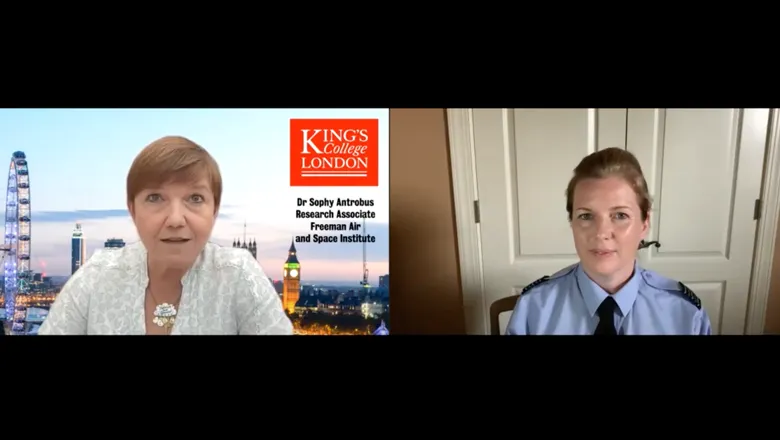If you can’t attempt to do something about [the diversity challenges]…as Chief of the Air Staff then you’ve got to have a pretty good reason why not.
Air Chief Marshal Sir Mike Wigston
13 May 2021
Freeman Air and Space Institute showcases inspiring women in air and space power
At the event ‘See it to be it’ leading women from the air and space domain shared their experiences, work and research.

This week the Freeman Air and Space Institute ran an event showcasing inspiring women working in the air and space power sector. Focusing the importance of diversifying air and space power, the panel speakers included the UK’s first ever fast jet pilot, Jo Salter to Nichola Bolton working on the UK government’s Space Strategy, to RAF aviator Air Commodore Suraya Marshall, the CEO of Airbus, Katherine Bennett, Wing Commander and researcher Jemma Austin and Freeman PhD researcher Julia Balm.
Chief of the Air Staff, Air Chief Marshal Sir Mike Wigston, closed the event reflecting on his commitment to diversity and inclusion. He talked about the challenges for women in an organisation, such as the Royal Air Force, ‘designed by men’. Underlining his commitment to improving equality in the RAF he said:
At the event the Freeman Air and Space Institute became a supporting signatory to the Women in Aviation and Aerospace Charter, which works towards gender equality in the sector. Congratulating the Institute on signing the charter, Victoria Foy, a member of their steering committee said:
By being part of the Charter, Freeman will inspire young women to pursue and fulfil their ambitions.
Victoria Foy
The speakers all emphasised the importance of recruiting talent from a diverse pool in the air and space sector, as well as the barriers the domain needs to overcome in realising this aim.
Jemma Austin underlined the importance of making the air space a safe and equal place for women and men, by discussing her ongoing research looking at the impact of difficulties women aircrew disproportionately face in terms of urinating while flying – which can risk safety and health. A theme the speakers bonded over, as others joked about the lack of access to loos from the air environment to conferences!
Other panelists highlighted the need for female role models to inspire young women and girls to pursue careers in air and space. They spoke of how in the early stages of their career they didn’t want to be singled out as women in the field, but in later life they realised how important it was to mentor and be visible so that junior female colleagues can ‘see it to be it’ as future air and space power experts. Air Commodore Marshall said:
As I’ve become more senior, I absolutely recognise the importance of them [role models] and the positive influence you have on others.
Air Commodore Suraya Marshall
Jo Salter, lamenting the energies expended on the problems caused in the workplace by a lack of diversity and inclusion, said:
Just imagine a world where these issues didn’t exist and people could focus on being amazing at what they do in their job and on their own well-being rather than spending time on inequality in the workplace.
Jo Salter
This is just the first of many events that the Institute wants to host highlighting diverse and inspiring talent in air and space power. The team are keen to include other communities including people of colour and those with disabilities, and to engage more with women in ‘air spaces’ – museums, the media, archives, – and anywhere engaged with air and space power.
